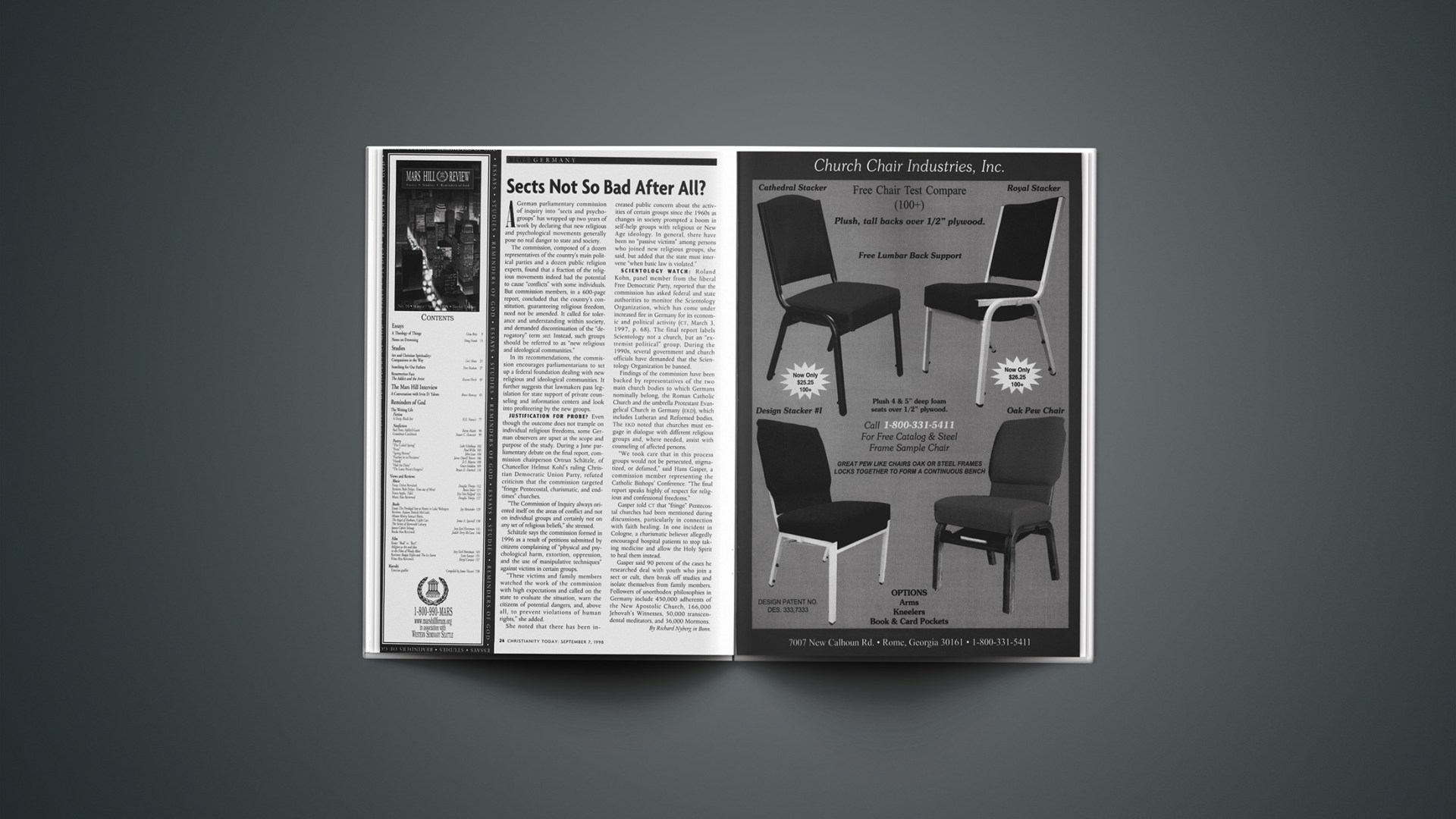A German parliamentary commission of inquiry into “sects and psycho-groups” has wrapped up two years of work by declaring that new religious and psychological movements generally pose no real danger to state and society.
The commission, composed of a dozen representatives of the country’s main political parties and a dozen public religion experts, found that a fraction of the religious movements indeed had the potential to cause “conflicts” with some individuals. But commission members, in a 600-page report, concluded that the country’s constitution, guaranteeing religious freedom, need not be amended. It called for tolerance and understanding within society, and demanded discontinuation of the “derogatory” term sect. Instead, such groups should be referred to as “new religious and ideological communities.”
In its recommendations, the commission encourages parliamentarians to set up a federal foundation dealing with new religious and ideological communities. It further suggests that lawmakers pass legislation for state support of private counseling and information centers and look into profiteering by the new groups.
JUSTIFICATION FOR PROBE? Even though the outcome does not trample on individual religious freedoms, some German observers are upset at the scope and purpose of the study. During a June parliamentary debate on the final report, commission chairperson Ortrun Schatzle, of Chancellor Helmut Kohl’s ruling Christian Democratic Union Party, refuted criticism that the commission targeted “fringe Pentecostal, charismatic, and end-times” churches.
“The Commission of Inquiry always oriented itself on the areas of conflict and not on individual groups and certainly not on any set of religious beliefs,” she stressed.
Schatzle says the commission formed in 1996 as a result of petitions submitted by citizens complaining of “physical and psychological harm, extortion, oppression, and the use of manipulative techniques” against victims in certain groups.
“These victims and family members watched the work of the commission with high expectations and called on the state to evaluate the situation, warn the citizens of potential dangers, and, above all, to prevent violations of human rights,” she added.
She noted that there has been increased public concern about the activities of certain groups since the 1960s as changes in society prompted a boom in self-help groups with religious or New Age ideology. In general, there have been no “passive victims” among persons who joined new religious groups, she said, but added that the state must intervene “when basic law is violated.”
SCIENTOLOGY WATCH: Roland Kohn, panel member from the liberal Free Democratic Party, reported that the commission has asked federal and state authorities to monitor the Scientology Organization, which has come under increased fire in Germany for its economic and political activity (CT, March 3, 1997, p. 68). The final report labels Scientology not a church, but an “extremist political” group. During the 1990s, several government and church officials have demanded that the Scientology Organization be banned.
Findings of the commission have been backed by representatives of the two main church bodies to which Germans nominally belong, the Roman Catholic Church and the umbrella Protestant Evangelical Church in Germany (EKD), which includes Lutheran and Reformed bodies. The EKD noted that churches must engage in dialogue with different religious groups and, where needed, assist with counseling of affected persons.
“We took care that in this process groups would not be persecuted, stigmatized, or defamed,” said Hans Gasper, a commission member representing the Catholic Bishops’ Conference. “The final report speaks highly of respect for religious and confessional freedoms.”
Gasper told CT that “fringe” Pentecostal churches had been mentioned during discussions, particularly in connection with faith healing. In one incident in Cologne, a charismatic believer allegedly encouraged hospital patients to stop taking medicine and allow the Holy Spirit to heal them instead.
Gasper said 90 percent of the cases he researched deal with youth who join a sect or cult, then break off studies and isolate themselves from family members. Followers of unorthodox philosophies in Germany include 450,000 adherents of the New Apostolic Church, 166,000 Jehovah’s Witnesses, 50,000 transcendental meditators, and 36,000 Mormons.
Copyright © 1998 Christianity Today. Click for reprint information.










